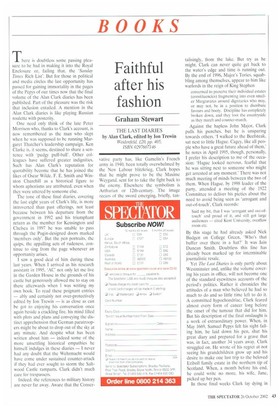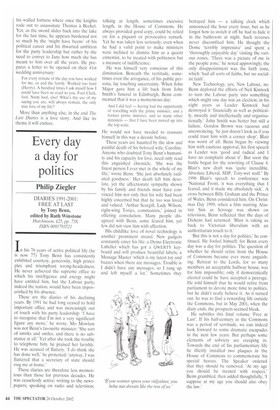Faithful after his fashion
Graham Stewart
THE LAST DIARIES by Alan Clark, edited by Ion Trewin Weidenfeld. 00, pp. 405, ISBN 0297607146 There is doubtless some passing pleasure to be had in making it into the Royal Enclosure or, failing that, the 'Sunday Times Rich List'. But for those in political and media circles the last opportunity has passed for gaining immortality in the pages of the Pepys of our times now that the final volume of the Alan Clark diaries has been published. Part of the pleasure was the risk that inclusion entailed. A mention in the Alan Clark diaries is like playing Russian roulette with posterity.
One need only think of the late Peter Morrison who, thanks to Clark's account, is now remembered as the man who slept when he was supposed to be running Margaret Thatcher's leadership campaign. Ken Clarke is, it seems, destined to share a sentence with 'pudgy puff-ball'. Other colleagues have suffered greater indignities. Such has Alan Clark's reputation for quotability become that he has joined the likes of Oscar Wilde, F. E. Smith and Winston Churchill as a historical figure to whom aphorisms are attributed, even when they were uttered by someone else.
The tone of these final diaries, covering the last eight years of Clark's life, is more introverted than past offerings, not least because between his departure from the government in 1992 and his triumphant return as the member for Kensington and Chelsea in 1997 he was unable to pass through the Pugin-designed doors marked 'members only'. But the pen portraits, the quips, the appalling acts of rudeness, continue to sing from the page whenever an opportunity arises.
I saw a good deal of him during these last years. When I arrived as his research assistant in 1995, 'AC' not only let me live in the Garden House in the grounds of his castle but generously allowed me to stay on there afterwards when I was writing my own book. To read these poignant entries — ably and certainly not over-protectively edited by Ion Trewin — is as close as can be got to enjoying his conversation once again beside a crackling fire, his mind filled with plots and plans and conveying the distinct apprehension that German paratroopers might be about to drop out of the sky at any minute. And despite what has been written about him — indeed some of the more unsettling historical empathies he himself indulges in these diaries — I never had any doubt that the Wehrmacht would have come under sustained counter-attack if they had ever sought to storm the Saltwood Castle ramparts. Clark didn't much care for trespassers.
Indeed, the references to military history are never far away. Aware that the Conser valve party has, like Gamelin's French army in 1940. been totally overwhelmed by the New Labour blitzkrieg, Clark hopes that he might prove to be the Maxirne Weygand, sent for to take the fight back to the enemy. Elsewhere the symbolism is Arthurian or 12th-century. The image recurs of the sword emerging, briefly, tan talisingly, from the lake. But try as he might. Clark can never quite get back to the water's edge and time is running out. By the end of 1996, Major's Tories, squabbling among themselves, appear to him like warlords in the reign of King Stephen
concerned to preserve their individual estates (constituencies) fragmenting into even smaller Margravates around dignitaries who may, or may not, be in a position to distribute favours and booty. Discipline has completely broken down, and they loot the countryside as they march and counter-march.
Against the hapless John Major, Clark pulls his punches, but he is unsparing towards others. 'I walked to the Beefsteak, sat next to little Hague. Cagey, like all people who have a great future ahead of them,' he notes in April 1995, though, personally, I prefer his description to me of the occasion: 'Hague looked nervous, fearful that he was sitting next to someone who might get arrested at any moment.' There was not much meeting of minds between the two of them. When Hague. by 1998 leader of the party, attended a meeting of the 1922 Committee to deliver his pieties about the need to avoid being seen as 'arrogant and out-of-touch', Clark records:
Said my bit, that I was 'arrogant and out-oftouch' and proud of it, and still got large audiences — cited Kent University, overflow room etc.
By this stage he had already asked Nick Budgen on College Green, 'Who's that buffer over there in a hat?' It was lain Duncan Smith. Doubtless this line has already been marked up for interminable journalistic resale.
Yet The Last Diaries is only partly about Westminster and, unlike the volume covering his years in office, will not become one of the standard eyewitness accounts of the period's politics. Rather it chronicles the attitudes of a man who believed he had so much to do and so little time left to do it. A committed hypochondriac, Clark feared almost every form of cancer long before the onset of the tumour that did for him. But his description of the final onslaught is a work of extraordinary power. When, in May 1669, Samuel Pepys felt his sight failing him, he laid down his pen, shut his great diary and prepared for a grave that was, in fact, another 34 years away. Clark struggled on. He wrote of his regret at not seeing his grandchildren grow up and his desire to make one last trip to the beloved Eriboll family estate in the northern tip of Scotland. When, a month before his end, he could write no more, his wife, Jane, picked up her pen.
In those final weeks Clark lay dying in his walled fortress where once the knights rode out to assassinate Thomas a Becket. Yet, as the sword slides back into the lake for the last time, he appears burdened not so much by the 'might have beens' of his political career and his thwarted ambition for the party leadership hut rather by the need to convey to Jane how much she has meant to him over all the years. He prepares a letter to be opened on their 41st wedding anniversary:
For every minute of the day you have worked for me, us and the family. Worked too hard (Henry). A hundred times 1 ask myself how I could have been so cruel to you. Fool Clark, fool, Nasty fool, also! What's the use of my saying you are, will always remain, the only true love of my life?
More than anything else, in the end The Last Diaries is a love story. And like its theme it will endure.



















































































 Previous page
Previous page